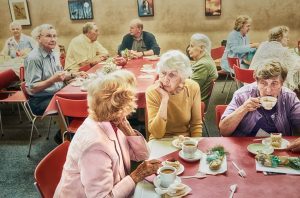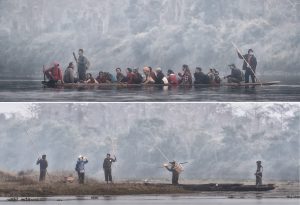I recall in my youth speaking to older people who looking back over their lives said, surprisingly to me, that the war years were the best years of their lives. It’s said of the English character that once the war was over, everyone retreated back to their little cottages and closed their garden gates to each other. Crisis bring us together and somehow despite the dire circumstances of a crisis, people find in the experience in a common challenge a meaning for their lives. Not simple some heroic bravado, the mantra for managing Covid-19, “to get through this together” represents a shared sentiment as a purpose to work for. Government public statements, pot banging in neighbourhoods at 7:30 PM, parents finding ways to educate and occupy their children, artists performing online, institutions and businesses reaching out in new ways, and of course, the essential workers stepping up to the front lines of battle are ways in which we come together and create from the chaos, new ways to affirm our common life, ways that makes us feel of value to someone else, ways to find satisfaction in feeling what we do is important. We join together with common purpose, get the most out of giving, helping, even sacrificing for the sake of others. We feel most human, most alive.
Many of us are contributing by self-isolating. It seems a counter experience to banding together, but somehow it is enough to zoom or wave from porch to porch, or thank someone who steps out into the street to maintain our social distance, somehow feeling closer to each for it. The gates of our little cottages might be closed, but our hearts are open to each other. And our life has meaning.

Retirement home strawberry shortcake tea to welcome the spring. 
The Ferry Ride: crossing the river in Chitwan Conservation Park, Nepal.
I have used my photographs as I’m working on them anyway, to help me relate to others who are going through a much harder time than myself. The first was a favourite photograph of residents in long-term care. It helped me to think about people rather than statistics when hearing the sad news of the deaths in nursing homes. The second photo was a diptych illustrating the huge gap of inequality of wealth in our society and the world. The current documentary, Thomas Piketty’s Capital in the 21st Century gives substance to appreciating the nature of the inequality. You can find it at
I was torn in the writing of that second reflection because the inequality is the result of individual and institutional choices and while I believe strongly in accountability, especially for those who assume so much control over our lives, the main thrust of my own work is to write about the dignity of all people best discovered by each of us in affirming the humanity of each other, not in pointing out faults. In the end, I feel hypocrisy has to be called out: if what one says about themselves is not supported in the actions of that person, the difference must be exposed. I wasn’t sure I could move into that work, the work of journalists and satirists, with my little blog of personal reflection. It bothered me.
In my counselling training in crisis work, I learned the valuable insight that distinguishes a person’s behaviour from the person her or himself. This is not to excuse any behaviour, but it is to see beyond the behaviour to a human being, frail as I am frail, in need of love as I am in need of love, in need of compassion as I. It is to see a person who is my not my enemy just because of their behaviour. The person would be my competition if I was concerned to enhance my material value, arrive at a place of high status and admiration. Making people right or wrong, judging their behaviour, usually for how much it matching our own values, is how to advance in the world. Rally one’s allies; push down one’s competitors We live in that kind of world, the world of a business culture, an ideology of evolution based on survival of the fittest, But the elders told me, the being together, finding our way together was what gave them the most heightened life experience.
How many hospital rooms did I enter of a dying or dead patient in the bed and look around at what was beside their bed and see photos of loved ones. Any markers of how important they were, how much wealth they had accumulated, how many victories they had won were not in evidence. In the end, they remember, hold on to, a person with a kind word, a spouse who was a faithful supportive companion, a child who cared and loved them, friends who were there no matter what.
In the telling of the human story, I think the most ennobling narrative is when two enemies, at war or siblings at enmity with each other can put down their weapons, forgive and embrace. Well, I correct that; the greatest story is when one shows love and compassion for another even when the other continues to hurt one. The most noble is the person who forgives, sees the other, their simple humanity, honours that, sees beyond the behaviour, loves them for who they are.
Photographer journalist Lisa in her interview about the many years she has returned to Haiti says how moved she is by the most beautiful of people, the Haitians who live in the worst poverty and violence of anywhere on the planet. She tells how beautiful they are in kindness and compassion for others. Should they not be our models, the examples for our children, the subjects of our tweets and you-tube videos, rather than the insouciant politicians and excessive, self-absorbed, celebrities flooding our current digital intake?
We have choices, choices for how we live. Our goals in life define those choices. In the end, we each need to question our goals, ask what would be my comfort as I take my last breath? How will I want to be remembered: that I won, beat them to the punch, manipulated my way past others, maybe lying about them, cheating them, hoarding for myself, and so be able to point to how much better I did; just look at my titles and wealth. Will people have nice memories of us? Will we die happy? Or will I live a life when once dead, that others will remember how generous of spirit, kind, respectful I was. By living in the good graces of others, the sages say, we shall be free, free to die, die happily. Is that so?
